
In this update:
- Legislative Updates
- Administration Updates
- Impeachment / Redistricting Updates
- Election Updates
- Midwest 2023 Polling Summit
Legislative Updates
Senate passes $2 billion tax cut and child care proposal
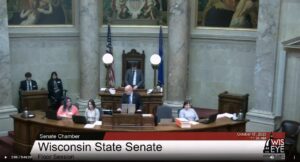
The Senate passed a $2.2 billion income tax cut and child care proposal after the Senate Economic Development and Technical Colleges Committee voted 4-2 in favor of it the day before. The amended special session bill passed on the Senate floor 21-11 with Republican Senator Steve Nass joining all Democrats in opposition to the bill. Sen. Nass said he voted against the proposal because he wants the child care provision in a separate bill so it would receive the proper attention.
The special session bill as first introduced was crafted by Governor Tony Evers (D) and would have spent over $1 billion to address workforce and childcare issues in the state. Senate Minority Leader Melissa Agard (D) was critical of the GOP amendment to the governor’s plan, saying it “guts” the Child Care Counts program. “Republicans are not serious about governing in the best interests of our state and it is abundantly clear that they have turned their backs on hardworking Wisconsinites,” Sen. Agard said. Republicans disagreed, saying the governor’s proposal was fiscally irresponsible. “Governor Evers’ workforce proposal would have grown the size of state government, increased state spending by more than $1 billion, and created onerous regulations on Wisconsin’s employers,” Senate Majority Leader Devin LeMahieu (R) said in a press release. “The legislature’s plan will put more money in the pocketbooks of Wisconsin families to address the effects of inflation and increasing child care costs.”
The income tax cut passed by the Senate would decrease the tax rate in the third highest bracket from 5.3% to 4.4%. The bill also includes a raise to the state income tax credit for those claiming the federal child and dependent care tax credit by increasing the employment-related expense limit. An increase to the deduction for having a child attend private school is also in the proposal. The bill now heads to the Assembly for consideration and action.
Assembly passes Brewers stadium bill
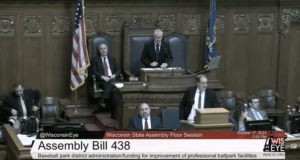
During its floor session, the Assembly passed a package of bills that would have the Brewers remain in Milwaukee until 2050. The bills, AB 438 and AB 439, were passed 69-27 with bipartisan support and now head to the Senate for consideration and action. Amendments were added to the initial package last week to decrease the contribution from the city and county to $135 million over 27 years with the state contributing $411 million. Assembly Minority Leader Greta Neubauer said her Democratic colleagues were split on the bills. “Our caucus is split on the bill today because we can hold many things to be true,” she said. “The Brewers are a real asset to our state. And this bill could have done more for the people of Wisconsin.”
Speaker Robin Vos (R) called the package a win for Wisconsin, the community, and the team, especially with additional revenue from winterizing the stadium. “The Milwaukee Brewers, millions of people every week, hear the name and associate a professional sports team with their community,” he said. “People visit, they bring their dollars here, they cheer for the team. While the Brewers are a statewide team, there’s no doubt about it, the most direct economic benefit is for the city and the county of Milwaukee.” Rep. Supreme Moore Omokunde (D) disagreed and said the proposal is an example of “sticking it to Milwaukee.” “It’s like all of Wisconsin wants to enjoy all Milwaukee has to offer, but few want to see Milwaukee prosper” he said. Rep. Rob Brooks (R) lead the deal’s negotiations and said the “stick it to Milwaukee” comments were “insulting,” and “sometimes it’s best to say ‘thank you.'”
The Legislative Fiscal Bureau (LFB) released a memo that estimates the amendments would decrease transfers to the general fund by $6.5 million in 2024-25, $6.7 million in 2025-26 and $6.9 million in 2026-27. By 2050, LFB predicts the reduction to the general fund would be $13.6 million. Also according to LFB, the city of Milwaukee will pay off its contribution by 2045 with its annual payments growing from $100,000 next year to $4.1 million in 2044 and $3.8 million in 2045.
Before the vote, Gov. Tony Evers said, “We’ve got to get it done. I’m ready to support it as is.” The bills now head to the Senate for consideration and action.
Senate rejects eight of Evers’ nominees
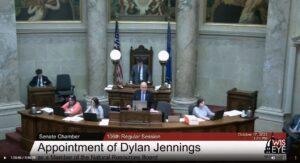
Republicans in the state Senate voted to reject eight of Governor Tony Evers’ (D) nominees, including four of the governor’s appointments to the Natural Resources Board, one to the Wisconsin Elections Commission, one to the Council on Domestic Abuse, one to the Livestock Facility Siting Review Board, and one to the Medical Examining Board. The four nominees to the Natural Resources Board (NRB), as well as the nominee to the elections commission, were rejected 21-11 with Senator Robert Cowles (R) joining all Democrats in favor of confirming, while the nominees for the other boards were rejected 22-10 along party lines. Immediately after the votes, Gov. Evers appointed replacements to fill the vacant positions. According to the Legislative Reference Bureau, only five executive appointments have been rejected by the Senate since the start of the 1981-82 session.
Sen. Mary Felzkowski (R) said she voted against the NRB nominees because some of them were unfamiliar with northern Wisconsin, while others signaled a willingness to adopt rules proposed by the DNR that run contrary to state law. “This is a message to Gov. Evers to appoint people who are up to speed on the state as a whole,” Sen. Felzkowski said. However, Sen. Cowles said appointments are the governor’s prerogative and if Republican lawmakers believed the NRB was breaking state law, they could reverse those policies at the committee level. “You’re gonna disagree with some people sometimes, you’re gonna agree with them other times,” Sen. Cowles said. “The governor has the appointment. He’s already appointed four more people, so where has this gotten you?”
The other notable rejection was the appointment of Joseph Czarnezki to the state elections commission. Mr. Czarnezki had been one of three commissioners to abstain from voting on the reappointment of Meagan Wolfe as elections administrator in June. Again, Sen. Cowles was the only GOP senator to vote in favor of the appointment, saying the elections commissioners are supposed to be partisans. “We can blame that on all of us. We created a partisan committee,” Sen. Cowles said. “That was a deliberate thing to create three Democrats and three Republicans. [Czarnezki] took the Democrat position.”
Following the Senate floor votes, Majority Leader Devin LeMahieu (R) released a statement that read in part “Wisconsinites will not stand for public servants who are unqualified or refuse to follow the law.” He also noted that nearly 98% of the appointments brought before the Senate have been confirmed with 444 of Gov. Evers’ appointments confirmed and 10 rejected. However, shortly after the Senate’s action, Gov. Evers announced new appointees to replace those who the Senate rejected. The new appointees are subject to the same Senate confirmation as the previous nominees.
Gov. Evers also released a statement calling the Senate’s decision to reject eight of his appointments “insanity,” and an “issue of democracy.” “These are good people they’re voting down today,” Gov. Evers said. “And I don’t care if you’re a Republican, a Democrat, or otherwise, these Wisconsinites are completely qualified to do the job they’ve been asked to do, and they are volunteering their time, talent, and expertise without pay to serve their neighbors and our state. Harassing them, belittling them, and publicly firing them just because Republicans have decided that’s the way they want politics to work these days, well, that’s just plain wrong.”
The governor’s new appointees are as follows:
Natural Resources Board
- Todd Ambs, former DNR deputy secretary
- Robin Schmidt, retired DNR employee
- Patty Schachtner, former Democratic state senator
- Douglas Cox, director of land management for the Menominee Tribe of Wisconsin
Elections Commission
- Carrie Riepl, former Eau Claire city clerk
Medical Examining Board
- Dr. Steven Leuthner, professor of Pediatrics and Bioethics at the Medical College of Wisconsin
Council on Domestic Abuse
- Shannon Barry, executive director of Domestic Abuse Intervention Services
Livestock Facility Siting Review Board
- This appointment is made by the DATCP secretary. A spokesperson for the agency said a replacement has not yet been considered.
Democratic lawmakers introduce “Tenant Protection Package”
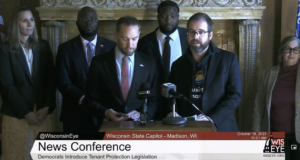
Democratic lawmakers led by Sen. Chris Larson (D) and Rep. Ryan Clancy (D) held a press conference to announce the introduction of the “Tenant Protection Package,” a package of 23 bills that would help tenants maintain housing and help those facing eviction. Rep. Clancy authored nine of the bills while Rep. Darrin Madison (D) authored a bill to remove limitations on local governments’ ability to require rental property inspections. He cited two apartment developments in Milwaukee that needed to be evacuated due to unsafe levels of the carcinogen trichloroethylene, or TCE, this year. “In talking to my constituents and local elected officials, the answer to this growing challenge has become more clear: these communities need the ability to create their own rental inspection programs for areas with higher potential contaminants,” Rep. Madison said.
Other bills include:
- LRB-2760: Establish a right for tenants to organize and penalties for those who violate it.
- LRB-3918: Consider it discrimination to ask potential tenants about or refuse tenants due to evictions that occurred more than five years prior.
- LRB-4544: Repeal a ban on local eviction moratoriums, which could be used in unexpected circumstances like the COVID-19 pandemic.
- LRB-0427: Make it illegal to discriminate in housing based on citizenship or immigration status.
Administration Updates
State ends fiscal year with record surplus and rainy day fund
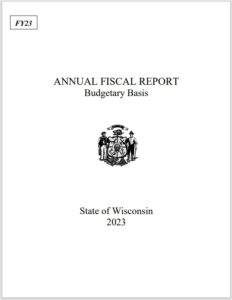 According to a joint release from Governor Tony Evers (D) and the state Department of Administration, the state concluded the most recent fiscal year with a record surplus of almost $7.1 billion, surpassing last year’s surplus of $4.3 billion. The annual fiscal report from DOA also noted the state’s rainy day fund continues to have a record high balance of $1.8 billion, which earns the state roughly $7 million in interest each month. Gov. Evers noted that although the state has a record surplus, “with this historic surplus comes historic opportunity and responsibility,” and called on Republican legislators to pass a $1 billion workforce package he introduced last month. “While we’ll continue to save wherever we can and stay well within our means, we also have a duty to invest in needs that have long been neglected — and that includes finally addressing our state’s generational workforce challenges and preventing the looming child care crisis that will only make our workforce problems worse,” Gov. Evers said.
According to a joint release from Governor Tony Evers (D) and the state Department of Administration, the state concluded the most recent fiscal year with a record surplus of almost $7.1 billion, surpassing last year’s surplus of $4.3 billion. The annual fiscal report from DOA also noted the state’s rainy day fund continues to have a record high balance of $1.8 billion, which earns the state roughly $7 million in interest each month. Gov. Evers noted that although the state has a record surplus, “with this historic surplus comes historic opportunity and responsibility,” and called on Republican legislators to pass a $1 billion workforce package he introduced last month. “While we’ll continue to save wherever we can and stay well within our means, we also have a duty to invest in needs that have long been neglected — and that includes finally addressing our state’s generational workforce challenges and preventing the looming child care crisis that will only make our workforce problems worse,” Gov. Evers said.
Republican lawmakers declined to pass the governor’s proposal and instead amended the special session bill crafted by the governor to include an income tax cut, as well as an expansion of tax breaks for child care costs and private school tuition. Joint Finance Committee Co-Chair Mark Born (R) said GOP policies were to thank for the state’s healthy fiscal condition and blamed Gov. Evers for vetoing most of the income tax cuts that had been passed by Republicans in the most recent state budget. “Republicans continue to believe the surplus is your money and you know how to spend it better than the government,” Rep. Born said. “We will continue to look for ways to return our state’s surplus to the hardworking taxpayers.”
Evers uses ARPA funds to extend child care subsidies
 Governor Tony Evers (D) announced he is directing $170 million in leftover federal pandemic aid to be used to continue providing state subsidies to child care providers through the Child Care Counts Stabilization Payment Program. According to a press release from the governor, the additional dollars will ensure the program is funded at current levels through June 2025. Over the past year, child care providers have called on the governor and legislature to do more to support the industry, saying that without the additional state dollars, they would need to close existing centers or increase the rates they charge parents.
Governor Tony Evers (D) announced he is directing $170 million in leftover federal pandemic aid to be used to continue providing state subsidies to child care providers through the Child Care Counts Stabilization Payment Program. According to a press release from the governor, the additional dollars will ensure the program is funded at current levels through June 2025. Over the past year, child care providers have called on the governor and legislature to do more to support the industry, saying that without the additional state dollars, they would need to close existing centers or increase the rates they charge parents.
Gov. Evers had previously proposed funding the child care subsidies through the recently-passed state budget, but the GOP-controlled legislature refused to do so. The governor then called a special session of the legislature where he proposed a workforce and child care funding package that included dollars for Child Care Counts, but that plan was also rejected by Republicans who argued the subsidies were not sustainable. Gov. Evers disagreed, saying the state does have the money to continue funding the subsidies by using its $7.1 billion surplus. “So, it’s unconscionable that, even as Wisconsin has the highest surplus in state history, Republicans won’t pass my comprehensive workforce plan to address our state’s generational workforce challenges and prevent the collapse of our state’s child care industry,” Gov. Evers said.
Following the governor’s announcement, Senate Majority Leader Devin LeMahieu (R) released a prepared statement that claimed Gov. Evers could have directed the additional pandemic relief funds towards the subsidies whenever he wanted and that he was the one saying child care providers would have to close if they didn’t get the additional funds. “Governor Evers vetoed the largest tax cut in state history and then spent months going around the state telling child care providers that they were going to have to close their doors when he could have used ARPA money to preserve Child Care Counts all along,” Sen. LeMahieu said. “Governing isn’t a game, and Governor Evers continues to irresponsibly play games with Wisconsin families’ budgets for political purposes.”
Redistricting / Impeachment Updates
Republicans submit new court filings over elections administrator appointment
 A new filing from private attorneys representing top GOP legislative leaders including Senate Majority Leader Devin LeMahieu (R) signaled a potential shift in tactics to remove Meagan Wolfe from her position as state elections administrator. The GOP counterclaim came in response to a lawsuit from Attorney General Josh Kaul (D) meant to keep Ms. Wolfe in place as head of elections after the Senate voted in September to remove her from the post. Previously, Republicans had argued the position was vacant, or alternatively, that Ms. Wolfe was illegally holding the office and should be impeached. However, in the latest filing, attorneys for the Senate Majority Leader acknowledged Ms. Wolfe remains a lawful holdover while also alleging that the Wisconsin Elections Commission (WEC) failed to do its non-discretionary duty to appoint an administrator at the expiration of Ms. Wolfe’s initial term on July 1. The GOP attorneys further alleged that WEC’s failure to carry out its duty deprived the Senate of its “clear legal right to give its ‘advice and consent’ on WEC’s appointment of an administrator,” and that “WEC’s lawless decision to refrain from making an appointment is a direct attack on that vital constitutional principle, given that the Senate cannot perform its assigned role until an appointment has been made.” The filing urges Dane County Circuit Judge Ann Peacock to issue an order by Nov. 1 compelling the WEC commissioners to “immediately” appoint an administrator.
A new filing from private attorneys representing top GOP legislative leaders including Senate Majority Leader Devin LeMahieu (R) signaled a potential shift in tactics to remove Meagan Wolfe from her position as state elections administrator. The GOP counterclaim came in response to a lawsuit from Attorney General Josh Kaul (D) meant to keep Ms. Wolfe in place as head of elections after the Senate voted in September to remove her from the post. Previously, Republicans had argued the position was vacant, or alternatively, that Ms. Wolfe was illegally holding the office and should be impeached. However, in the latest filing, attorneys for the Senate Majority Leader acknowledged Ms. Wolfe remains a lawful holdover while also alleging that the Wisconsin Elections Commission (WEC) failed to do its non-discretionary duty to appoint an administrator at the expiration of Ms. Wolfe’s initial term on July 1. The GOP attorneys further alleged that WEC’s failure to carry out its duty deprived the Senate of its “clear legal right to give its ‘advice and consent’ on WEC’s appointment of an administrator,” and that “WEC’s lawless decision to refrain from making an appointment is a direct attack on that vital constitutional principle, given that the Senate cannot perform its assigned role until an appointment has been made.” The filing urges Dane County Circuit Judge Ann Peacock to issue an order by Nov. 1 compelling the WEC commissioners to “immediately” appoint an administrator.
Notably within the filing, the GOP leadership’s attorneys agreed with several arguments put forward by AG Kaul that Republicans had previously disputed including:
- Wolfe is lawfully holding over.
- The elections commission’s vote on June 27, 2023, did not appoint Ms. Wolfe to a new term.
- The Senate’s vote on September 14, 2023, to remove Ms. Wolfe as elections administrator was symbolic.
- The Joint Committee on Legislative Organization (JCLO) does not have the power to appoint a new administrator while Ms. Wolfe is holding over.
In response to the filing, Assembly Speaker Robin Vos (R) said he asked to be removed from the lawsuit, calling it “the Senate’s lawsuit,” while also saying he doesn’t necessarily agree the Senate’s vote to remove Ms. Wolfe was symbolic or that JCLO lacks the authority to appoint a replacement administrator. Senate President Chris Kapenga (R) also asked to be removed from the lawsuit. Meanwhile, Senate Majority Leader LeMahieu said focusing on the commission’s failure to carry out its statutory duty was Republicans’ best legal strategy to force the commission to appoint a new administrator. “We think it’s our best legal advice,” Sen. LeMahieu told reporters on Thursday.
Democrats also responded publicly to the GOP’s counterclaim. “I’m glad they have finally acknowledged these realities, though it’s a shame it took the filing of litigation to get to this point,” AG Kaul said in a statement. “Wisconsin DOJ will continue to pursue this matter in court to prevent any further unnecessary confusion about the WEC administrator and to protect the fair administration of elections in Wisconsin.
New briefs filed in redistricting case
The attorneys representing Republican lawmakers in the legislative redistricting lawsuit said in a recent filing there is not enough time to resolve the case in the courts before the 2024 elections, so the state Supreme Court should target the 2026 elections for any changes. The GOP-backed attorneys also said the legislature and governor should first be given the opportunity to reach an agreement on new legislative maps if the court allows the lawsuit to proceed, citing a GOP bill currently making its way through the legislature that supporters say would implement an “Iowa-style” redistricting process. The GOP filing warned the court that if Justice Janet Protasiewicz participates in a ruling that overturns the current maps, GOP lawmakers will appeal to the U.S. Supreme Court.
Meanwhile, the Democratic voters who filed the redistricting lawsuit also submitted a new brief asking the court to overturn the current district lines and create new ones by March 19th so the maps would be ready for the 2024 elections. The Democratic voters said if the court does decide to allow the governor and legislature to try to create new maps as requested by the GOP attorneys, they only be given three weeks to do so.
Read the filings: click here
Election Updates
Crowley launches re-election campaign for Milwaukee County Executive
Milwaukee County Executive David Crowley officially announced that he will seek re-election in April 2024. Accompanying the re-election announcement, his campaign also announced a five-figure digital ad campaign touting Executive Crowley’s accomplishments during his first term.
Executive Crowley was first elected Milwaukee County Executive in 2020 with 50% of the total vote, defeating state Senator Chris Larson (D) by 0.5 percentage-points. Prior to his election as county executive, Mr. Crowley served two terms in the state Assembly representing the 17th Assembly District as a Democrat.
Midwest 2023 Polling Summit
Michael Best Strategies sponsored and hosted WisPolitics’ 2023 Midwest Polling Summit that featured a panel of experts discussing the political climate as the 2024 presidential election approaches and how states like Wisconsin will influence the presidential nominations. The panel included the chief politics reporter at the Des Moines Register Brianne Pfannenstiel, the director of the University of New Hampshire Survey Center Andy Smith, and Director of the Marquette University Law School poll Charles Franklin.
Watch the event: click here



